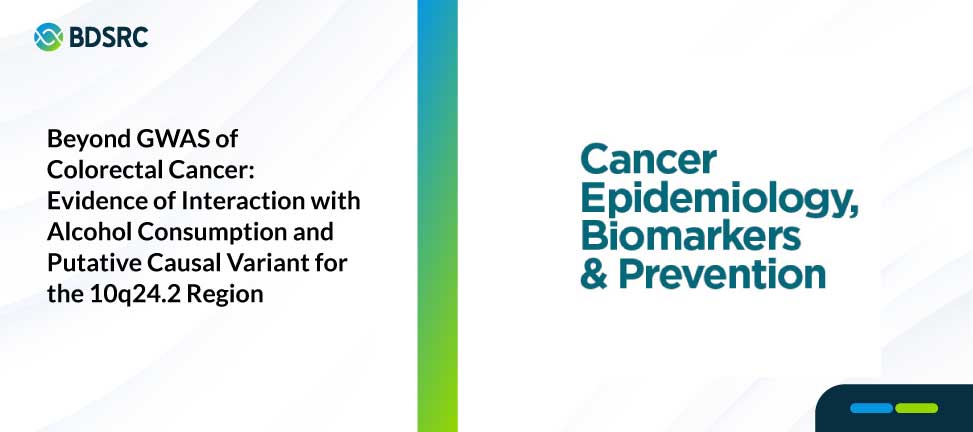Beyond GWAS of Colorectal Cancer: Evidence of Interaction with Alcohol Consumption and Putative Causal Variant for the 10q24.2 Region

Background: Currently known associations between common genetic variants and colorectal cancer explain less than half of its heritability of 25%. As alcohol consumption has a J-shape association with colorectal cancer risk, nondrinking and heavy drinking are both risk factors for colorectal cancer. Methods: Individual-level data was pooled from the Colon Cancer Family Registry, Colorectal Transdisciplinary Study, and Genetics and Epidemiology of Colorectal Cancer Consortium to compare nondrinkers (≤1 g/day) and heavy drinkers (>28 g/day) with light-to-moderate drinkers (1-28 g/day) in GxE analyses. To improve power, we implemented joint 2df and 3df tests and a novel two-step method that modifies the weighted hypothesis testing framework. We prioritized putative causal variants by predicting allelic effects using support vector machine models. Results: For nondrinking as compared with light-to-moderate drinking, the hybrid two-step approach identified 13 significant SNPs with pairwise r2 > 0.9 in the 10q24.2/COX15 region. When stratified by alcohol intake, the A allele of lead SNP rs2300985 has a dose-response increase in risk of colorectal cancer as compared with the G allele in light-to-moderate drinkers [OR for GA genotype = 1.11; 95% confidence interval (CI), 1.06-1.17; OR for AA genotype = 1.22; 95% CI, 1.14-1.31], but not in nondrinkers or heavy drinkers. Among the correlated candidate SNPs in the 10q24.2/COX15 region, rs1318920 was predicted to disrupt an HNF4 transcription factor binding motif. Conclusions: Our study suggests that the association with colorectal cancer in 10q24.2/COX15 observed in genome-wide association study is strongest in nondrinkers. We also identified rs1318920 as the putative causal regulatory variant for the region. Impact: The study identifies multifaceted evidence of a possible functional effect for rs1318920.
Cancer Epidemiology Biomarkers & Prevention
Kristina M Jordahl, Anna Shcherbina, Andre E Kim, Yu-Ru Su, Yi Lin, Jun Wang, Conghui Qu, Demetrius Albanes, Volker Arndt, James W Baurley, Sonja I Berndt, Stephanie Bien (Rosse), D Timothy Bishop, Emmanouil Bouras, Hermann Brenner, Daniel D Buchanan, Arif Budiarto, Peter T Campbell, Robert Carreras-Torres, Graham Casey, Tjeng Wawan Cenggoro, Andrew T Chan, David V Conti, Christopher H Dampier, Matthew A Devall, Virginia Díez-Obrero, Niki Dimou, David A Drew, Jane C Figueiredo, Steven Gallinger, Graham G Giles, Stephen B Gruber, Andrea Gsur, Marc J Gunter, Heather Hampel, Sophia Harlid, Tabitha A Harrison, Akihisa Hidaka, Michael Hoffmeister, Jeroen Huyghe, Mark Jenkins, Amit D Joshi, Temitope O Keku, Susanna C Larsson, Loic Le Marchand, Juan Pablo Lewinger, Li Li, Bharuno Mahesworo, Victor Moreno, John L Morrison, Neil Murphy, Hongmei Nan, Rami Nassir, Polly A Newcomb, Mireia Obón-Santacana, Shuji Ogino, Jennifer Ose, Rish K Pai, Julie R Palmer, Nikos Papadimitriou, Bens Pardamean, Anita Peoples, Paul D P Pharoah, Elizabeth A Platz, John D Potter, Ross L Prentice, Gad Rennert, Edward Ruiz-Narváez, Lori C Sakoda, Peter Scacheri, Stephanie L Schmit, Robert E Schoen, Martha Slattery, Mariana C. Stern, Catherine M Tangen, Stephen N Thibodeau, Duncan C Thomas, Yu Tian, Kostas Tsilidis, Cornelia M Ulrich, Franzel J B van Duijnhoven, Bethany Van Guelpen, Kala Visvanathan, Pavel Vodicka, Emily White, Alicja Wolk, Michael O Woods, Anna H Wu, Natalia Zemlianskaia, Jenny Chang-Claude, W James Gauderman, Li Hsu, Anshul Kundaje, Ulrike Peters
